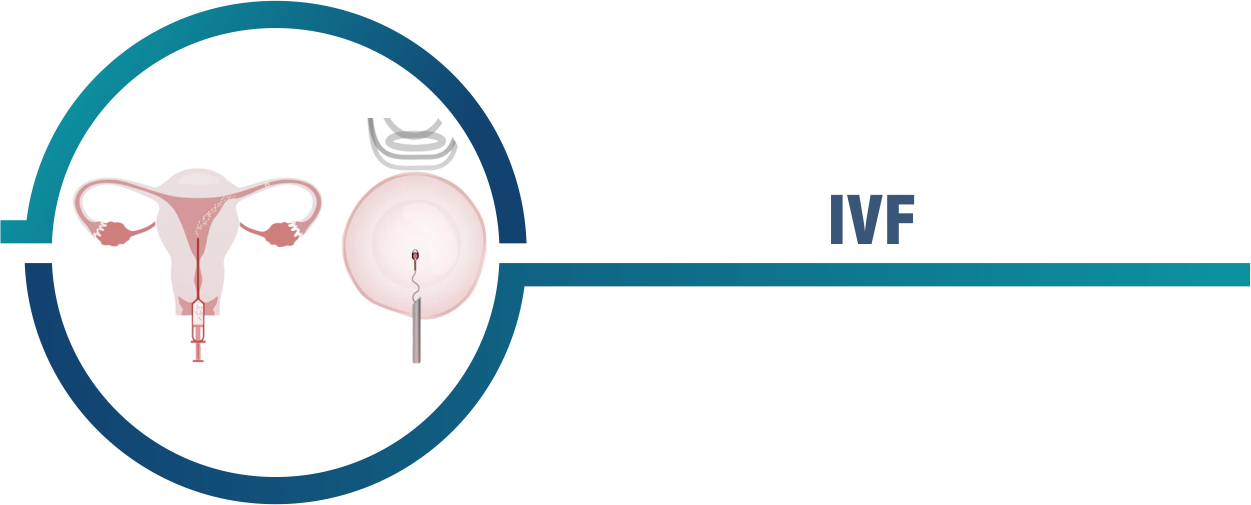
About IVF
In Vitro Fertilization (IVF) is the most effective form of assisted reproductive technology, in which mature eggs are collected (retrieved) from ovaries and fertilized in a laboratory by sperm. The fertilized egg (embryo) or eggs (embryos) are then placed in the uterus. A full IVF cycle takes about three weeks. You can use your own eggs and your partner's sperm for the procedure. Alternatively, IVF may use eggs, sperm, or embryos from a known or anonymous donor.
Symptoms
IVF is sometimes recommended as a primary treatment for infertility in women over the age of 40. If you have certain medical conditions, IVF can also be performed. For example, if you or your partner suffers from:
- Fallopian tube damage or obstruction : Damage or blockage of the fallopian tubes makes it difficult for an egg to be fertilized or an embryo to travel to the uterus.
- Ovulation problems: When ovulation is infrequent or absent, there are fewer eggs available for fertilization.
- Endometriosis :Endometriosis occurs when tissue similar to the uterine lining implants and grows outside of the uterus, frequently interfering with the function of the ovaries, uterus, and fallopian tubes.
- Fibroids in the uterus : Fibroids are uterine tumors that are not cancerous. They are common in women in their thirties and forties. Fibroids can obstruct the implantation of a fertilized egg.
- Tubal sterilization or removal in the past : Tubal ligation is a type of sterilization that involves cutting or blocking the fallopian tubes to permanently prevent pregnancy. If you want to get pregnant after tubal ligation, IVF may be a better option than tubal ligation reversal surgery.
- Sperm production or function is impaired: Poor sperm mobility, low sperm concentration, or abnormalities in sperm size and shape can make it difficult for sperm to fertilize an egg. If abnormalities in the sperm are discovered, a visit to an infertility specialist may be required to determine whether there are any correctable issues or underlying health concerns.
- Unknown cause of infertility : Unexplained infertility indicates that no cause of infertility has been identified despite testing for common causes.
- A genetic condition :If you or your partner are at risk of passing on a genetic disorder to your child, you may be a candidate for IVF-based preimplantation genetic testing. After the eggs have been harvested and fertilized, they are screened for genetic problems, though not all genetic problems can be detected. Embryos that do not have any known problems can be transferred to the uterus.
- Fertility preservation in the case of cancer or other medical conditions: If you are about to begin cancer treatment that may harm your fertility, such as radiation or chemotherapy, IVF for fertility preservation may be an option. Women can have their eggs harvested from their ovaries and frozen unfertilized for future use. Alternatively, the eggs can be fertilized and frozen as embryos for later use.
Risk Factor
- Multiple births.
- Premature delivery and low birth weight.
- Ovarian hyperstimulation syndrome.
- Miscarriage.
- Egg-retrieval procedure complications.
- Ectopic pregnancy.
- Birth defects.
- Cancer.
- Stress.
Investigations
Before beginning an IVF cycle with your own eggs and sperm, you and your partner will most likely need a variety of screenings, including:
- Ovarian reserve testing.
- Semen analysis.
- HIV Screening.
- Uterine exam.
| Procedure | India | Turkey | Dubai |
| (Price in USD) | (Price in USD) | (Price in USD) | |
| IVF | 4000 | 2500 | 7000 |
| ICSI | 2268 | 2700 | 5000 |
| IVF with Donor Eggs | 3065 | 5000 | 16000 |
| IVF-1 cycle own egg and sperm + IMSI including Injections | 2500 | - | 6300 |
| IVF - 1 cycle own egg and sperm+ ICSI including Injections | 2452 | 2484 | 5000 |
| Frozen Embryo Transfer (FET) | 551 | - | 2200 |
| TESA/ PESA | 612 | - | 1100 |
| Blastocyst Culture and Transfer | 183 | - | 11000 |
| Endometriosis | 4289 | 6840 | 8167 |
Note : This is an approximate cost and may vary depending on various condition of the patient health after physical evaluation.
Treatment Options
Side Effects
- Passing a small amount of clear or bloody fluid shortly after the procedure — due to the swabbing of the cervix before the embryo transfer.
- Breast tenderness due to high estrogen levels.
- Mild bloating.
- Mild cramping.
- Constipation.
Benefits
Success Rate
The success rate of IVF treatment in India is determined by the woman's age and the cause of infertility in either or both partners. The percentage of IVF cycles that result in a live birth is approximately:
40% to 43% for women under the age of 35
31% to 35% for women aged 35 to 37 years
21 to 25% for women aged 38 to 40 years
11 to 15% for women aged 41 to 42 years
5 % of the total of women over the age of 42
